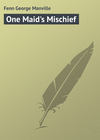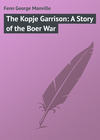Buch lesen: «One Maid's Mischief», Seite 33
Volume Three – Chapter Seventeen.
A Question of Escape
Bang! Crash!
The report of the brass lelah and the stroke of the iron ball as it shivered the branches of the trees or buried itself in the trunk of some palm-tree growing near the bank, but without injuring the occupants of the sampan in the slightest degree.
The faces of Ismael and his companion were now of a curious muddy hue, and they shivered with dread, but they held the doctor even more in awe, and obeyed his orders to keep on paddling with such strength as was in them left, and seemed ready enough to persevere as long as the boat would float beneath them, hopeless as the case might be.
As the doctor very well knew, it was only a question of time, and had he been alone he would not have hesitated about surrendering; but with Helen in his charge, there was too much at stake. So he determined, with all the stubbornness of an Englishman, to hold out to the very last extremity.
“I’m a man of peace,” he muttered, “but I’ve had to fight in my time, and if I am driven to it, they shall buy Helen Perowne at the cost of three or four lives at least; and if I can manage it, the chiefs shall be one.”
He glanced at Helen, who lay back with her eyes closed, and her swarthy face seemed to rouse a bitter feeling of anger in the doctor’s breast.
“The blackguards!” he growled. “To serve an English lady like that. I’ll make some of them pay for it, and dearly too.”
“I say, Bolter,” he muttered, “I’d no idea that you were such a brave fellow. I don’t feel half so nervous as I expected I should, and hang me if I’ll give up till I have fairly fought it out. I wonder whether I could hit master Rajah Murad at this distance? Well, let him put his head over the side of the boat, and I’ll try – What, my dear,” he cried, as Helen spoke feebly.
“Is our position hopeless, Doctor?” she said.
“Hopeless? Not a bit of it, my dear. I’m going to exhibit another medicine directly. You lie quite still and don’t raise your head. Trust to your medical man, my dear. Always have confidence in your medical man.”
For answer she turned her great dark eyes upon him with a look of such hopeless misery that the doctor set his teeth hard.
“By Jove!” he cried, starting in spite of himself, as there was a sharp report and a bullet whistled close by him. “Hi! you scoundrels! How dare you fire upon a boat containing a Queen’s officer.”
He let the butt of his gun rest in the bottom of the vessel, and turned and shook his fist threateningly at the advancing prahu; but the only answer elicited was another shot, not by any means so well aimed as the last, the sound of which seemed to ring in his ear as it whizzed by.
“The scoundrels shall smart for this!” he cried, furiously. “They’ve fired – bear witness of this, Ismael – they’ve fired upon a boat containing a British officer and an English lady, and – hang ’em! there they go again!”
And this shot and another came whizzing by, but the rapid motion of the sampan, the want of practice on the part of the Malays, and their bad management of their clumsy gun, kept them from doing any mischief to the fugitives.
“At last!” cried the doctor, as the dense mass of vegetation that screened the mouth of the little river came in sight. “Now then, my lads, keep up. You shall be rewarded handsomely for this. Make a good dash for it, and we shall soon be clear.”
Doctor Bolter’s words were big, and his face was cheerful, but his hopes were small, and his heart felt very sad, for he knew well enough that unless as soon as they cleared the canes and bushes before them, and got out into the open river, they found help or concealment, which was extremely doubtful, they would be at a terrible disadvantage. For out in the wide river the prahu would have plenty of room to manoeuvre; it could be driven at full speed, turned easily, and would either run them down or come alongside and grapple them without the slightest difficulty.
“But I’ll fight for it to the last,” muttered the doctor, as he caught a fresh glance from Helen’s sorrowful eyes. “Poor little woman! what a fidget she would be in if she only knew! Never mind, she would pat me on the back for what I am doing; and whatever she might say against it on my account, she’d want me to fight.”
He looked back at the prahu, which was still advancing, and raised his gun to fire, but only lowered it again.
“No,” he muttered; “a waste of shot. I couldn’t hit the steersman.”
He stood thinking for a moment, and then, laying down his gun, he took up a spare paddle and began working with all his might, striving to urge the boat forward.
The help came when it was most needed, for the floating reeds and bushes were no light obstacles to so small a boat, and they began to lose ground now as they struggled through. But after a fierce interval of effort, and just as the doctor was growing giddy with excitement, and half blind with exertion, the last mass of bushes was passed, and they floated clear into the swift stream of the main river.
“Now for it, my lads!” cried the doctor, manfully, the perspiration streaming down his red-brown face, as he made the water flash from his paddle; “we shall do it now.”
But before they had gone fifty yards down the stream, at a far higher rate than before, they heard the rustle and crashing of the big prahu forcing its way through the bushes, and in another minute it, too, would have been clear.
Fortune does, however, sometimes favour the brave; for just then there was a sharp crack, and one of the prahu’s sweeps broke short off, the man who pulled it fell back heavily against his neighbour, who in turn was thrown out, and like skittles, half a dozen of the rowers were in confusion.
This happened at a critical moment, just as the men were rowing their hardest, and the result of the check on one side was that the head of the prahu was pulled sharply round, and the stem crashed in amongst the bushes to the left of the steersman, ran right into the soft, muddy bank, and the vessel lay across the stream.
Doctor Bolter could not tell what was wrong; but he could hear the noise of shouting and the confusion that followed, enough to explain to him that there was something very much amiss, and in the satisfaction that it gave him he mentally exclaimed:
“I don’t wish harm to any man upon the face of this little earth, but if that prahu and all on board are going to the bottom, it will be a blessing indeed.”
This respite gave the Malay boatmen heart, and bending once more to their task, they strove hard to send the sampan onward so as to get round a curve of the stream where the trees of the jungle grew high upon the bank and spread far out over the river. This bend once passed, they would be out of sight when the prahu cleared the bushes.
It was a long way ahead, and the shouting and confusion seemed so terribly close at hand that the doctor fully expected another shot; but he paddled bravely on, and at last this part of their task was achieved, giving them a fresh sensation of relief as they saw the wide, open stretch of river before them, with its verdant, tree-shaded banks.
But they looked in vain for help: the stream was clear of boats, and the doctor knew that concealment was now their only chance. The Malay – Ismael – knew it too, for, raising his paddle from the water, he pointed to a dense spot that seemed admirably adapted for a hiding-place; the doctor nodded assent, and with a sweep of the paddle the course of the boat was altered, her head being set across the stream. Then, as the doctor looked back to see that they were not followed, a warning cry from the boatmen made him lower his head, just as the sampan glided in beneath the overhanging boughs, and they floated on in a pleasant arcade of leafy boughs, the grateful shadows shutting them entirely from the sight of passers-by upon the river, whose glittering surface they surveyed through a thick screen of leaves.
Volume Three – Chapter Eighteen.
“I Wish you Success.”
“Gone at last, my dear!” exclaimed Mrs Bolter. “I’m sure that woman will drive me mad.” Then, turning to the Resident – “I feel now, Mr Harley, as if I ought to have opposed it much more strenuously. I don’t like his running up and down the country like this, and I’m very much troubled about it. Of course I don’t put any faith in what such a woman as that Mrs Barlow would say, but she would keep hinting that there is more in these journeys than we know of. I feel, of course, that I ought not to stoop to notice such remarks, but when one is left like this they will make an impression. I don’t think the doctor ought to have gone away and left me alone.”
“I sincerely wish that he had not gone,” said the Resident; “but Doctor Bolter’s ardent love of natural history and his belief in discovery must be his excuses for a great deal.”
“Yes, yes, I know!” cried the little woman excitedly; and a severe mental struggle was evidently going on to keep back something upon her mind. But it was all in vain. The passionate feeling of jealousy that had been lit by the foolish tongue of the woman who had been constantly coming in and harping upon the theme, now began to glow, and in spite of her efforts the anger fanned the flame, till, in a gust of passion that made her cheeks burn with shame for her question, she turned suddenly upon the Resident.
“I know it is a shame and a sin to say such a thing, but I can’t help it now. I think it’s your hot climate here has changed me, and made me what I am – but you are going up the river on this expedition Mr Harley?”
“Yes, of course.”
“Will you wait for him?”
“For the doctor? I’m afraid we must not wait much longer.”
“Then will you go to that woman’s as you pass up the river, and make a thorough search? I’m ashamed to say it, but I feel perfectly sure that Doctor Bolter is there.”
“Where? At the Inche Maida’s?” said the Resident, wonderingly.
“Yes. I am sure he is there.”
“And I am certain that he is not!” cried Hilton, so warmly that the Resident glanced at him.
“But I – I’m greatly afraid he is,” panted Mrs Bolter. “Mrs Barlow said that she felt sure it must be so, and I’ve made a very, very great mistake in leaving my quiet little home in England, and letting my brother accept this chaplaincy.”
“Dear Mrs Bolter – pray hush!” whispered Grey, as her cheeks burned with shame. “It cannot be as you say.”
“My dear Mrs Bolter!” cried the Resident.
“He would not of course of his own ideas,” sobbed Mrs Bolter, who was now thoroughly unhinged; “but he must have called there when looking for gold, or insects, or birds, and been deluded into staying at that dreadful woman’s house.”
“I’ll swear it is not so,” said Hilton, warmly. “There, there, my dear Mrs Bolter, you may make yourself easy on that score! I’ll answer for our old friend the doctor.”
“Bless you, Mr Hilton!” sobbed the little woman, catching at his hands; “it is very, very good of you to say this. I never liked you one-half so well before.”
“You are upset,” said Hilton, warmly, “and no wonder. Your anxiety must be terrible, and I can understand that you feel ready to snatch at any explanation of his long absence; but my dear Mrs Bolter, give us men the credit of being a little too strong to be so easily led away.”
He spoke in so frank and manly a tone, as he stood holding Mrs Bolter’s hands, that Grey’s eyes lit up, and she darted a look at him full of pride and thanks. But it was not seen, for Hilton was looking down at poor, troubled little Mrs Bolter, whose secret, one of which she felt bitterly ashamed, was now out.
She was burning with jealousy, for she idolised her husband; and the love that had so long lain latent seemed to be all the stronger for its long quiescence. She disowned the idea of being jealous to herself, and was about to burst into a furious speech; but her effort to govern herself succeeded.
Shame and vexation covered her as with a garment; and hiding her face in her hands, she sank back in her chair, sobbing as if her heart would break!
Grey knelt down at her side as Hilton drew back, wrinkling his brow, half with vexation, half with contempt, as he looked now at the Resident.
Mr Harley returned the glance, and they both stood looking on, wanting to leave but hardly liking to stir, as poor little Mrs Bolter sobbed forth her trouble, with her head buried now in Grey Stuart’s breast.
“We cannot wait longer,” said the Resident at last; “we must go and risk it. If we have any casualties, we must trust to our own surgical knowledge, and do the best we can.”
“Yes,” said Hilton; “every minute is precious; but I am afraid that we are going to a war of words, and not to a war of weapons. Let us go. Perhaps Mrs Bolter will beg of the doctor to come after us in one of the small boats if we miss him on our way up.”
“Stop a minute,” said Mrs Bolter, recovering herself by an effort, and standing up, red of eye and cheek. “He will not come back here while you are gone, and I will hesitate no longer. I shall go with you!”
“Go with us?” cried the Resident and Hilton in a breath.
“Yes,” said the little woman, decidedly. “I shall go!”
“But it is impossible!” cried the Resident. “There may be fighting!”
“Then you would want help. I do know a little surgery, and more nursing; so I could be of great service.”
“But, my dear Mrs Bolter!” cried Hilton.
“Now, it is of no use for you to talk!” cried the little lady. “I feel it is a duty that I am called upon to fulfil. There is my brother somewhere up in those dreadful jungles, as thoughtless and as helpless as a child. He is all strength in goodness and spiritual matters; but as to taking care of himself, he is like a baby. I know he is lost!”
“It is very good of you,” said the Resident, warmly; “but, my dear Mrs Bolter, pray trust to us to find all our missing people. You know what Doctor Bolter is.”
“Yes – no – yes – no!” she cried, passionately. “I don’t quite know him yet; but I know my duty as his – his – wife. I shall go: for if he has, through his weakness, been led into any entanglement with that wretched, wicked black creature, I know and I feel, that at any suffering to myself, I ought to go and fetch him back – and I will!”
As she said this in a fierce determined way, the two officers gazed again in each other’s faces, amused, vexed, troubled, puzzled; for what, they silently asked each other, were they to do?
“Mrs Bolter – dear Mrs Bolter!” said Grey Stuart, solving the problem for them, as, in a tender, womanly way, she passed her arm round the determined little lady, and drew her to her breast, “you are angry and upset by your trouble; but you will – no – you cannot do this thing! You love dear Doctor Bolter too well to misjudge him. Pray, pray think of the pain it would give him, did he know that you had thought and spoken like this!”
“And – and as I never did before – before – he came and – and disturbed my quiet life at home!” cried the little woman. “You – you are right, my darling! I – I couldn’t do such a thing; and I wouldn’t have said it only – only – I am half mad! Don’t – don’t recollect all this, Harley – Captain Hilton! It is of course impossible! Go at once – and – bring him back to me, for this suspense is more than I can bear!”
“We’ll do our best,” said the Resident. “There, cheer up. We’ll forget all this, and so will you when our dear old friend is back. Tell him we wanted his help and counsel badly, but we could not wait. Tell him, too, that I share his suspicions.”
“Suspicions?” cried little Mrs Bolter, firing up once more.
“Yes, on the subject we discussed,” said the Resident, gravely, as he shook hands. “There, good-bye. Wish us success.”
“Yes, wish us success,” said Hilton, taking her hand. “I pledge you my word that you are right in what you now think about the doctor, who is as true a little gentleman as ever breathed!”
Poor little Mrs Bolter uttered a sob, and raised Hilton’s hand to her lips and kissed it for the words he had uttered, for she dared not trust herself to speak!
“Good-bye,” said the Resident again. “All this is as good as dead, and quite forgotten!”
“Yes, yes,” said little Mrs Bolter. “You will keep a sharp look-out for dear Arthur. I feel sure he is wandering about somewhere, half-starved, but loaded with specimens that he has found.”
“Good-bye, Miss Stuart,” said Hilton, in a low, grave voice, for he felt deeply moved, and his heart had seemed to swell within his breast as he looked on while she had seemed to lead and control her excited, passion-swayed friend. “Wish me success, for I shall try, while I have life, to restore to you your unfortunate friend.”
“Yes,” she said, softly; and the sad tears stood in her eyes. “I wish you success.”
“Helen Perowne will need all your love and sympathy when we bring her back.”
“As I pray Heaven you will,” she said, quietly. “You will have our constant prayers for your safety. Good-bye.”
“Good-bye.”
Their hands touched for a moment, and a thrill of misery flew to each heart.
“How he must love her!” thought Grey. “Oh! Helen, how can you trifle with him as you do?”
“I remember,” thought Hilton, as he turned away, feeling as wretched as he had ever felt in his life, “that I used to read a little fable, when I was a child, about a dog and his shadow. I’ve been running after the shadow all this time, and I have lost the substance. Unlucky dog!”
“What are you thinking about, Hilton?” said the Resident, as they stepped out of the cool, shady veranda into the blazing sunshine, and began walking towards the landing-place to embark for the Residency island.
“Thinking?” said Hilton. “Oh! I don’t know; only that it would not be of much consequence if a fellow got a Malay spear through his lungs.”
Volume Three – Chapter Nineteen.
Labour in Vain
The fugitives had not been lying in their shady place of concealment many minutes before the loud buzz of voices and shouting ceased. Then came the whishing and brushing noise of twigs and bushes, and in the midst of the silence that followed they made out the beating of oars once more, and soon after the prahu came into sight, gliding swiftly down the stream.
As it came nearer, those in the sampan hardly dared to breathe, but crouched there, waiting patiently till the great vessel had passed.
So plainly could everything be seen in the broad sunlight that, as the crew were evidently keeping a sharp look-out on both sides, it seemed impossible, in spite of the hanging boughs, for the fugitives to remain unseen.
Nearer came the prahu, the steersman sending it well in towards them; a dozen eyes were fixed upon the leafy screen, and feeling that the time for desperate action had come, the doctor took up his gun and held it ready for use, if, after a parley, the occupants of the prahu sought to rob him of what he reasonably called his prize.
They were anxious moments, and more than once, when the prahu was close abreast, the doctor made sure, from the expression of the men’s faces, that they could see through the screen.
But no; the water was ablaze, in its ripple, as it were, with silver fire; the leaves glistened in the sun’s rays, and beyond them all seemed to be in impenetrable darkness, the result being that the prahu passed on its way, going faster and faster, till, as the doctor parted the leaves to gaze out, the stern of the long row-boat disappeared round a bend some five hundred yards away, and the question now was, what was the best thing to do?
Helen was nearly fainting with heat and excitement; and gently lifting her, so that her head was by the side, the doctor spent the next few minutes in bathing her face with the clear cold water that glided swiftly in amongst the overhanging boughs.
“Well, Ismael, what next?” said the doctor. “Do you think we might venture to follow them slowly down?”
“No, master!” was the emphatic reply. “The prahu will not go far without finding that we are not in front; then she will leave a small boat with men to see that we do not pass, while the prahu comes back to search the river sides. Sampans and small prahus always hide under the branches like this.”
“Then why propose such a blind trick?” cried the doctor.
“If the master could have shown a better way his servants would have been content,” said the Malay, humbly.
“But I could not propose a better way!” cried the doctor, angrily. “We could not escape from a swift boat like that. Well, what shall we do?”
“I should land, master, and try to escape through the jungle.”
“Impossible!” cried the doctor, glancing at Helen’s swollen feet. “She could not walk a mile, and we could not carry her.”
“It would not be wise to try and go up-stream, master,” said the Malay.
“I don’t know that,” replied the doctor. “We must get away somewhere. To stay here is to be hunted out and taken.”
He paused to listen, and as he did so the beat of the great oars came loudly; and directly after he sank back in the boat with a look of misery upon his face, for the prahu could be seen once more returning up-stream, and to have attempted to leave their concealment now meant certain capture.
It soon became very evident that the officer in command of the prahu felt sure that they were in hiding somewhere close at hand, for he had his boat steered close in to the opposite shore; and as they glided slowly by, men with poles thrust aside the branches, and keen eyes were evidently peering scrutinisingly amongst the leaves.
The doctor turned angrily in his place, thinking of what he should do; but all thought seemed in vain, and the conclusion was forced upon him that their only chance was to lie quiet and trust to their not being seen.
He was a man, however, of no little activity of mind; and as soon as this was forced upon him he immediately set to work to try and improve their position.
Giving his instructions, then, in a whisper, the sampan was dragged in closer to the shore, and leaves and boughs being reached were dragged over them, the doctor cutting several branches to lay over the boat where it was fixed in its place; and this being done, he made the Malays lie down, he remaining in a kneeling position as he enlaced the boughs above his head till all was to his satisfaction, after which he crouched down and waited.
Poor Doctor Bolter had worked at his task till the perspiration streamed from his face, little thinking that he had closed up every aperture through which danger might enter but one, and that one was plain to anyone in search of the fugitives.
It was very unfortunate, but it never occurred to him. He had broken the branches with the greatest care, turning huge leaves over the broken ends to keep them from looking strange, and he had carefully picked up and laid in the boat every leaf that had been broken off, but still there was a sign visible by which the searchers might detect the hidden party should they use any diligence as they came that way.
The fugitives were not long kept in suspense, for very soon the plash of the prahu’s oars was heard, and then the shadow of the great boat shut out some of the light as she brushed against the branches. Oars and poles beat aside the boughs, and the excitement grew intense as the searchers came nearer and nearer. The two boatmen laid their heads upon their knees, and Dr Bolter placed the gun in the bottom of the boat, gave Helen’s hand a reassuring pressure, and then took up his revolver as being a better weapon for such close quarters.
“They’re in here somewhere,” cried a voice in Malayan; “beat the branches aside; they must be found.”
The crew of the prahu encouraged each other with shouts as they bent aside the boughs; and the boat, after being rowed some little distance past them, was allowed to drift slowly down, some of the men holding on by the branches to keep her from going down-stream too fast.
The fugitives lay quite still, hardly daring to breathe as this went on, the search at one time being so near that they felt that they must be seen. But in spite of the keen searchings of a score or so of piercing eyes, the prahu slowly passed them lower and lower down the stream, till the voices began to grow faint.
“Saved, my dear,” said the doctor, in a whisper. “They will not come back now. Hold up a bit longer, and I will see you safe in your father’s arms.”
In spite of her efforts, Helen could not keep back a passionate burst of tears, her sobs, stifled though they were, becoming so hysterical that the doctor grew alarmed, and tried hard to comfort her.
“Thank goodness!” he muttered at last, as she calmed down; and he was in the act of raising his handkerchief to wipe his streaming face, when he turned cold, for the prahu was being rowed up-stream once more.
There was nothing for it but to lie still and wait, for there was a possibility of the search being ended; but to their agony and despair, the vessel was allowed to come slowly floating back, the search being continued till, as they came nearly opposite, one of the crew uttered a loud shout, and pointed to where, like a silvery patch in the darkness, the sun was shining in upon the doctor’s glistening bald head.
The next minute the prahu’s stem was forced in amongst the bushes and overhanging boughs, and half a dozen Malays dropped from her side right into the boat.
Doctor Bolter made a desperate attempt at defending his charge, but one of the prahu’s crew leaped right down upon his back, jerking his arm so that the first shot from his revolver went into the jungle, the second through the bottom of the sampan, and the third remained in the pistol-chamber, for the trigger was not drawn, the pistol being wrenched from his hand.
The next few minutes were occupied in binding roughly him and his men, and then, in spite of his angry denunciations and threats of the British vengeance, they were hauled into the prahu. Helen was slung up – she being quite prostrate now – and amidst the laughter and chattering of the swarthy Malays, the prahu’s head was turned towards the little river, with the sampan towing behind, and the boats soon after went rushing through the water on their upward way.
“Horrible!” muttered the doctor, as he realised his position. “They will take us up the little river to that scoundrel’s place in the jungle, and I never told a soul where we were going. Was ever anything so unlucky? As for that Murad, once let me get the opportunity, and he shall smart for this – a vile, treacherous scoundrel! Poor Helen, what can I do!”
He drew his breath painfully through his teeth as he uttered these words, for just then a showily-dressed Malay went to where Helen was seated, and going down upon one knee, he raised her head.
“Poor girl, she is fainting!” muttered the doctor. Then his heart seemed to stand still, for Helen uttered a piteous cry for help, and for the first time the doctor saw that the showily-dressed Malay supporting Helen’s head was the Rajah himself!




















